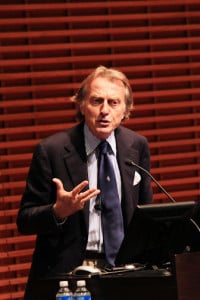According to Ferrari Chairman Luca Cordero di Montezemolo, the Italian car manufacturer has much in common with Silicon Valley companies, including product exclusivity and priority of design and details. Still, Montezemolo told the Stanford community Tuesday that a recent meeting with Apple CEO Tim Cook had him thinking about his company in a new way.
“I learned about two things yesterday: simplicity and passion for the work,” Montezemolo said of the meeting.
The Ferrari chairman made the comment during the latest event in the Graduate School of Business’s (GSB) “View from the Top” speaker series. During the talk, held in Cemex Auditorium, Montezemolo gave an overview of his guiding leadership principles, arguing that leaders are most successful if they have passion, vision and demands.

“You must be creative, look ahead, be the first client of your product,” Montezemolo said. He added that a company must be able to integrate a brand’s history with its future trend-setting design.
Montezemolo, introduced as a former racing driver, worked as an assistant for the company’s founder Enzo Ferrari in the 1970s. Two decades later, Montezemolo found himself taking over as Ferrari’s chairman, with the job of rejuvenating the Ferrari corporation’s supremacy as both a racing team and global brand.
According to Montezemolo, leaders and workers must all be willing to embrace change and new opportunities.
“You must give your workers the best conditions to succeed…have clear goals, clear priorities [and] the possibility to grow up,” Montezemolo said, emphasizing the need to seek internal growth within a company.
Montezemolo noted that an industry leader, such as Ferrari in the automotive world, must both make confident decisions and take bold risks in order to stay on top. Later, he commented that some of these risks might result in failure, but even the risk of failure is a risk worth taking.
Echoing Stanford’s enthusiasm for innovation, he repeatedly emphasized his belief in “innovation 360 degrees.” According to Montezemolo, a company must be willing to be innovative with its approach to its every aspect, from its employees to the international market. Integrating new technology is a given, he said, and innovation cannot stop with a single innovative process or product.
Montezemolo advised the audience to be curious, but also wary, of technology. Technology should only be granted to those who can use it, he said.
Regarding the company’s past focus on a male market, Montezemolo explained that Ferrari has experienced an increase in female influence.
Ferrari now offers extensive personalization for its clients, and buyers can choose from a selection of colors and materials. This tailoring process, Montezemolo said, was created primarily for women. Although women only purchased approximately 1 percent of all Ferraris a few years ago, women now comprise approximately 10 percent of Ferrari buyers in the United States and 20 percent in Beijing.
Montezemolo also touched on Ferrari’s approach to sustainability and the environment. He said Beijing will see Ferrari’s first model with an integrated kinetic energy recovery system, which will reduce the vehicle’s emissions by 40 percent.
He also spoke about Ferrari’s headquarters in Maranello, which he said are completely off the grid and meet all of their energy demands through renewable resources.
“We have trees inside the factory. Not on the campus — inside the building,” Montezemolo said, noting several other innovative aspects of the headquarters, such as bikes for employees and architecture that emphasizes natural lighting.
Ferrari also plans to develop a performance hybrid in the next few years, although it plans to steer away from the idea of an entirely electric vehicle, Montezemolo said. When asked to explain why he does not see an electric Ferrari in the cards, Montezemolo grinned.
“It’s a little hard to run 600 horsepower on electricity,” he said.